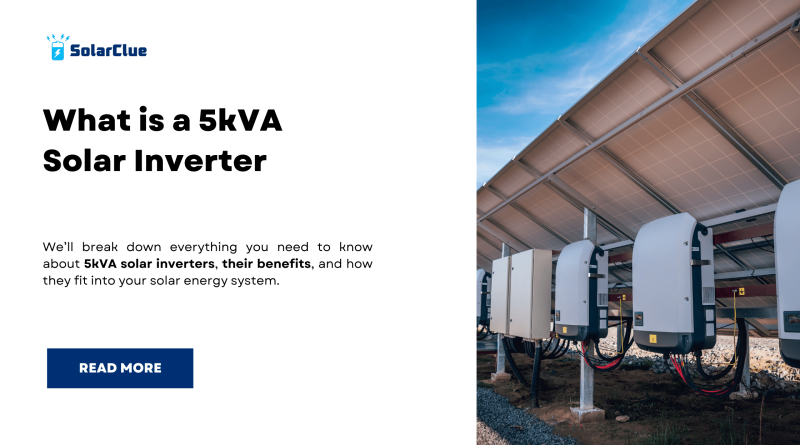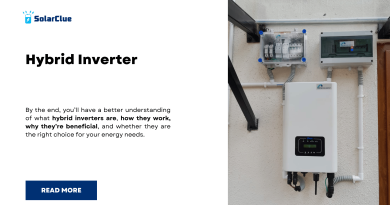5kVA Solar Inverter
In today’s world, many people are looking for ways to harness renewable energy, and solar power is at the forefront of this movement. If you’ve ever considered going solar, you might have come across the term “5kVA solar inverter.” But what exactly does this mean? In this guide, we’ll break down everything you need to know about 5kVA solar inverters, their benefits, and how they fit into your solar energy system.
Table of Contents
What is a 5kVA Solar Inverter?
Before diving into specifics, let’s clarify what an inverter does. Simply put, an inverter is a device that converts direct current (DC) electricity generated by solar panels into alternating current (AC) electricity, which is what most household appliances use. The term “5kVA” refers to the inverter’s capacity to handle loads up to 5 kilovolt-amperes. This means it can support a certain amount of power demand in your home.
Why 5kVA?
The “kVA” measurement is important. It stands for kilovolt-amperes and measures apparent power. For household use, this translates to about 4kW of usable power, depending on your appliances and their power factors. A 5kVA inverter is a great choice for small to medium households that wish to run multiple devices simultaneously, such as lights, fans, refrigerators, and other electrical appliances.
How Does a 5kVA Solar Inverter Work?
To understand how a 5kVA solar inverter works, let’s break down the process into a few simple steps:
- Solar Panels Generate DC Power: Your solar panels absorb sunlight and convert it into DC electricity.
- Inverter Converts DC to AC: The 5kVA inverter takes this DC electricity and converts it into AC electricity that your home can use.
- Power Distribution: The AC power is then distributed to various appliances in your home.
- Grid Connection (if applicable): If you’re connected to the grid, any excess power generated can be fed back into the grid, allowing you to earn credits or offset your energy bill.
Advantages of a 5kVA Solar Inverter
There are several benefits to choosing a 5kVA solar inverter for your home:
| Advantage | Description |
|---|---|
| Cost-Effective | A 5kVA inverter is generally more affordable than larger models, making it accessible for families looking to go solar without breaking the bank. |
| Sufficient Power Supply | Ideal for small to medium households, it can handle most daily energy needs effectively. |
| Easy Installation | Many 5kVA inverters are compact and easy to install, often requiring less space than larger units. |
| Energy Efficiency | Modern inverters come with advanced technology that maximizes energy conversion rates, minimizing waste. |
| Grid-Tied Options | Many models can work in conjunction with the grid, allowing for additional savings and efficiency through net metering. |
Choosing the Right 5kVA Solar Inverter
When selecting a 5kVA solar inverter, consider the following factors:
1. Type of Inverter
There are different types of inverters available:
- String Inverters: These are the most common and are connected to a series of solar panels. They are ideal for installations with minimal shading.
- Microinverters: These are smaller inverters attached to each solar panel. They are useful in situations where panels may receive uneven sunlight.
- Hybrid Inverters: These can work with both solar panels and batteries, allowing for energy storage.
2. Efficiency Ratings
Look for inverters with high efficiency ratings (typically above 90%). The higher the efficiency, the more of the generated power will be usable in your home.
3. Warranty and Support
A good warranty (typically 5 to 10 years) is crucial. It indicates the manufacturer’s confidence in their product. Additionally, check for customer support options.
4. Price and Brand
Do your research on various brands. Prices can vary significantly, so it’s important to find a balance between quality and cost.
Installing Your 5kVA Solar Inverter
Steps to Installation
- Site Assessment: A professional should assess your home’s roof and electrical systems to determine the best setup.
- Design and Permits: Your installer will create a design and obtain the necessary permits.
- Installation: This involves mounting the solar panels and inverter, connecting wiring, and setting up the electrical systems.
- Inspection: Before going live, your system will be inspected to ensure everything is up to code.
- Grid Connection: If connected to the grid, your utility company will need to approve the setup.
Maintenance Tips
Once your 5kVA solar inverter is installed, it’s essential to keep it running smoothly. Here are some maintenance tips:
- Regular Inspections: Check the inverter for any error messages or warning lights.
- Clean Panels: Keep your solar panels clean to ensure maximum sunlight absorption.
- Watch for Shading: Ensure that trees or other structures aren’t shading your panels.
- Monitor Performance: Use monitoring tools to track energy production and consumption.
Conclusion
A 5kVA solar inverter can be a fantastic investment for anyone looking to tap into the power of solar energy. It provides an efficient, cost-effective way to manage your home’s energy needs while contributing to a greener planet. Whether you’re driven by savings, environmental concerns, or both, a solar inverter is a key component of any solar energy system.
So, if you’re thinking about going solar, take your time to research and choose the right inverter that fits your needs. Your future self—and the environment—will thank you!
Visit SolarClue® to see the best Solar Inverters. SolarClue® actively sells solar energy products at discounts of up to 50% on its online marketplace.
FAQs
1. What appliances can a 5kVA solar inverter run?
A 5kVA solar inverter can typically handle multiple appliances, including lights, fans, refrigerators, televisions, and even smaller air conditioners, depending on their combined wattage.
2. Can I run my inverter without solar panels?
Technically, yes, but the inverter won’t be able to generate power on its own. It requires solar panels to convert sunlight into electricity.
3. What happens during a power outage?
If your inverter is grid-tied and there’s a power outage, it will automatically shut down for safety reasons. However, if you have a hybrid inverter with battery storage, you may still have power.
4. How long do solar inverters last?
Most solar inverters last between 5 to 15 years, depending on the type and how well they are maintained.
5. Can I upgrade my inverter later?
Yes, if you find your energy needs have increased, you can upgrade your inverter to a larger model. Just consult with a solar professional for guidance.
6. Is it worth investing in a solar inverter?
Absolutely! Investing in a solar inverter is a crucial step towards reducing your electricity bills and minimizing your carbon footprint.




Looking for a reliable and efficient 5kVA Inverter? Feston Sev offers top-quality solar inverters designed to maximize energy savings and provide uninterrupted power supply. With advanced technology and excellent performance, Feston Sev’s inverters ensure optimal energy usage for homes and businesses. Make the switch to clean, renewable energy with Feston Sev and enjoy long-term savings and sustainability. Check out their range today!
Thanks for sharing! Feston Sev’s 5kVA inverter sounds impressive — reliable performance, energy efficiency, and a smart move toward sustainability. Definitely worth checking out!
If you’re looking for a good and reliable 5kVA inverter for your solar power needs, Feston Sev is a great choice. Their 5kVA solar inverter gives strong and steady performance, helps save energy, and works well for a long time. It’s perfect for homes and small businesses that want a smart and safe power backup. With Feston Sev, you can enjoy clean energy and worry-free electricity. Choose Feston Sev’s 5kVA inverter and make your solar setup even better!
For More Info. :- https://festonsev.com/
Hi,
Thanks for sharing information about Feston Sev’s 5kVA solar inverter. It’s great to hear about reliable options in the solar energy space. We appreciate your input and will definitely check it out!
Thanks!